#✘ muse file
Explore tagged Tumblr posts
Text
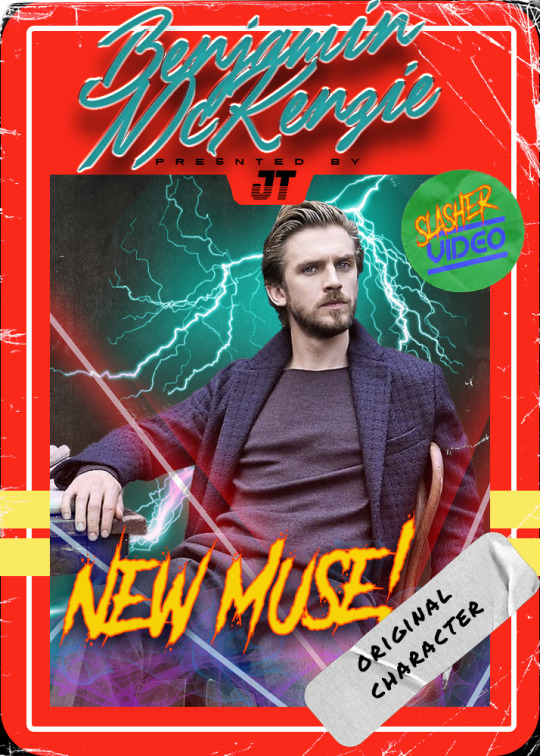
➠ New Muse Added: Benjamin McKenzie - OC
✘ stats
muse level: primary
fc: dan stevens
type: oc
age: 37
gender: cis male
pronouns: he/him
sexuality: bisexual
occupation: small town cop / former homicide detective in NYC
✘ notes
This is my grumpy man who refuses to believe in the paranormal, even though he has a history of seeing and interacting with ghosts. Below the cut is a ficlet detailing his background.
It all started when I was ten years old. The summer of 1997 in Falmouth, Massachusetts was an unusually hot one. I spent my days out of the house, playing in a creek bed that ran through a forest behind my house. That was where I met Bobby Brinley who was one year older than me. We'd meet everyday out there and play pirates, or cops and robbers. We even built a small tree fort with scrap wood we "borrowed" from my dad's garage. I liked Bobby. He was kind and outgoing. His energy never seemed to dim. We could play in that forest for hours on end until the sun went down we had to part ways for supper.
It was near the end of that summer, late at night, when my parents' voices woke me from my sleep. They were agitated. It wasn't entirely unusual for them to have quarrels now and again, but hearing my name piqued my interest. I crawled out of bed and sat on the floor by the old air vent where I could hear the echoes of their argument with perfect clarity.
"It's not normal, Susan! How can you encourage this?"
"Imaginary friends are a good sign of creativity. Besides, wouldn't you rather he be outside in the fresh air instead of rotting away on the couch all day with video games like those Kelley boys do?"
"Bobby Brinley??"
There was a feminine sigh of exasperation. "He probably heard the name on the news or something."
"You know who my imaginary friend was? Blackbeard. A man of legend and fame. Christ, he could even make someone up for all I care. But ours is the only boy who's imaginary friend is the murdered dead kid they found in the river those years ago!"
That was all I remembered of the argument before a ringing in my ears took over. I stayed up the whole night, unable to sleep as I puzzled over what that meant. When morning came, I ran out of the house so fast that I barely stopped to grab a Pop-Tart on my way. Just as I had for weeks before, I went to the spot at the creek bed to meet Bobby. Only this time, he wasn't there. I yelled his name. I waited for hours. The sun eventually got low in sky, shadows growing longer, when I realized that he wasn't coming. In fact, I'd never see Bobby Brinley again.
The experience didn't instill a belief in the supernatural. Quite the opposite. Even as a child with a wild imagination, I knew that ghosts had no place in reality. I was twelve when I was allowed to use the microfiches in the library by myself. I poured over every article I could find that mentioned Bobby Brinley. Though he was found in the river, he died of strangulation. The killer was never found. A new obsession was ignited within me. I wanted justice for my friend. I wanted justice for all the children who's lives were snuffed out too early while their killers walked free. I studied to become a cop, and eventually, I moved away from the placid little town of Falmouth and became a homicide detective in New York City.
I was damn good at my job, able to notice the small details that most people overlook. Maybe I was too good. I never settled down or married or anything like that. My life was the job, but I didn't mind it that way.
At least, not until that night last November when my very beliefs would be tested to their core.
Homicide in the big apple is no walk in the park. I see the worst of the worst, day in and day out. Things that make an Eli Roth film look like a kid's movie. Though the majority of my cases are one-off's, like petty squabbles turned deadly or mindless thievery gone wrong, every now and then a real sicko comes across my desk. I was working a serial case, trying to track the killer before he could strike again.
It was late that November night and rain pelted the windshield of my old 1970 Chrysler 300. The car was built like a tank, painted tan and chugging along down the street. There had been a phone tip about unusual activity at a particular house in a little suburban neighborhood and I wanted to do a drive by to see the place for myself. The rain made reading the addresses on the houses difficult. As I was squinting to make one out, I suddenly caught sight of the figure in the road. Slamming on the breaks, the Chrysler squealed to a stop before I could hit the girl in the street. Her hands were up and she was screaming, pleading for help. Leaning across the velvet bench seat, I unlocked the passenger side door and she quickly took the invite and hopped in. The poor girl had to be no more than twenty. She wore blue cotton shorts and a pink tank top with no shoes. She shivered as her long, brown curly hair dripped around her face.
I turned on the heat and started again down the road. "The station's not far from here. I'll get you help. You're safe now," I tried to reassure her.
"No!" she yelled. "Right! Turn right! Turn right now!"
There was such a frantic determination in her voice that I was compelled to comply. That's when I heard her mumble a number over and over. It wasn't hard to decipher that she was giving me the address. "Fifty-one fifty-two. Fifty-one fifty-two. Fifty-one fifty-two."
When I saw 5148, I knew I was close. Grabbing my radio, I called for back up, having no idea what I was walking into. Then 5152 Elm Lane came into view. The small, one story house sat dark, appearing as though it were trying to look hidden on the street. "This one?"
The girl looked right at me, opened her mouth, and let out a heart rattling scream. It startled me and I jumped slightly, but quickly composed myself. She was clearly under duress. "It's ok, it's ok. Stay in the car and lock the doors. I'll be right back, okay? Lock the doors." I grabbed my gun from the glove compartment, checked the chamber, the holstered it before getting out into the unrelenting rain. Catching her eye, I pointed at the door handles and she understood, leaning over to lock the doors of the old car. Satisfied that she was safe, I headed into the house.
"This is the police! Is anyone home?" The first thing that hit me was a wave of a putrid scent. I knew that sickening smell all too well. It was the smell of death. This was definitely the right house. "I'm armed! Come out slowly." Unnerving silence was the only reply I got.
Gun held, just as I was trained, I slowly made my way through the living room and towards the kitchen, straining my ears for any sound that didn't belong. "I repeat, this is the police and I'm ar-" A sudden movement whipped behind me before something large and heavy was brought down on my head. Knees buckled and I fell to the linoleum floor, trying to blink away the stars in my eyes. Looking up, I saw a young man standing over me, the bat in his hands raised above his head. I was startled to see how normal he looked. Clean cut, short blonde hair, jeans and a sweatshirt. But those eyes... There was nothing in those brown eyes, even as they widened to show off the whites all around the irises. They were dead eyes, and I knew they were the eyes of a killer.
The bat swung again and I felt a sharp pain in my fingers as my gun went skittering across the floor. I stared up at him, waiting for the final blow as he raised the bat once more. Instead of my skull being cracked in, I heard two gun shots. A small spray of blood hit my cheek and I looked up to see the crazed man fall to his knees, a look of disbelief written across his face as he hunched over onto the floor.
Back up had arrived in the nick of time. As the cop tended to the wounded assailant, I grabbed up my gun and got to my feet. "McKenzie!" I heard the familiar voice of my partner yell from down the hall. "Get in here! You'll wanna see this." I knew instantly that the sight that awaited me was in fact something I'd never want to see, but something I had to. Joining my partner in one of the bed rooms, I was met with a grisly sight indeed. A young girl lay sprawled across the bed, her limbs tied down. She wore blue cotton shorts and a pink tank top. Her eyes were open with the unmistakable vacant look of death in them. It was the long, curly brown hair that stood out for me.
"Jones. What about the girl in my car?" I asked, unable to tear my eyes from the body.
"What girl in your car?" Jones replied quizzically. I met her gaze and saw that my partner was speaking in earnest.
Without explanation, I hurried out of the bedroom, down the hall and out the front door of the house. In the driveway sat my 1970 Chrysler 300. Empty. But the locks on the doors were still down, showing that it had been locked from the inside.
That was the last case I worked in NYC. After packing up, I moved back to Falmouth and took a job as a cop there, hoping for a quieter life. And therapy. Oh, there was so much therapy. Because surely the problem was with my head and not actual ghosts, right?
Surely there couldn't be ghosts...
3 notes
·
View notes
Text
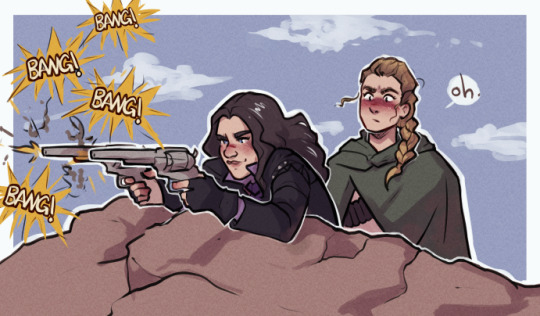
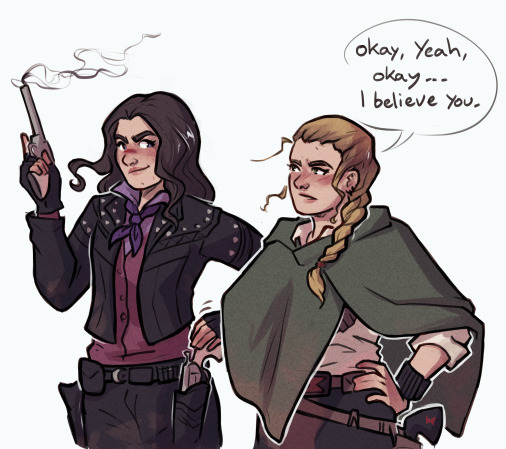


pt 2: of Bishova cowboy au 🔫🐎🤠
#my art muse has been on vacation apparently#also I lost this art file TWICE when my PC crashed on it#so it has been a long slow time coming#but anyways heres part 2#which I finished cos I want to move to part 3 where I can draw peggynat too lol#mine#art#marvel art#mcu art#bishova#kate bishop#yelena belova#hawkeye#black widow#what if#what if...?
979 notes
·
View notes
Text
Part of the enjoyment of watching stuff like The X-Files or Buffy or Star Trek or whatever is that like. Yes, there are some excellent episodes that are truly incredible, but sometimes an episode is the dumbest shit you've ever seen in your life AND IT'S DELIGHTFUL.
I mentioned this to a friend yesterday and she was like "Oh yeah because you know there will be good episodes again so it doesn't bother you!" but no. The bad episodes are fun on their own for me. I don't always want a slick streaming series with 8 episodes where each one is a work of tightly written cinematic excellence. I can enjoy that, too, but sometimes I want an episode with the dumbest premise known to man. Not all dumb, not all the time, not badly made or created as a joke, but just...silly but heartfelt.
Like yeah, okay, I love getting an episode where Brad Dourif is channeling the dead and it's beautiful and tragic and thought provoking and powerful, but sometimes I also enjoy "the problematic weirdly sexy genderfluid Amish people turned out to be aliens you guys" performed without a breath of irony.
702 notes
·
View notes
Text
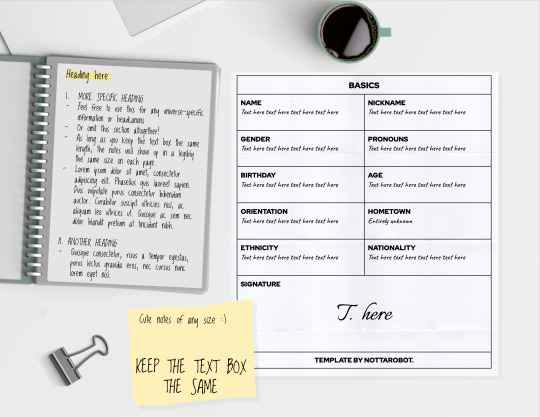
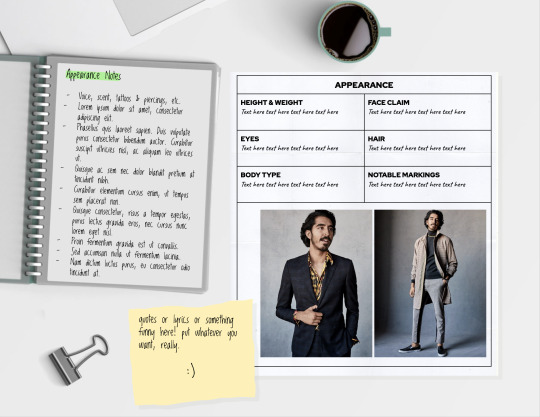
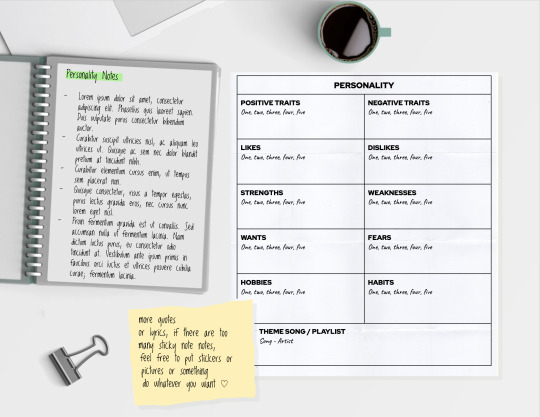
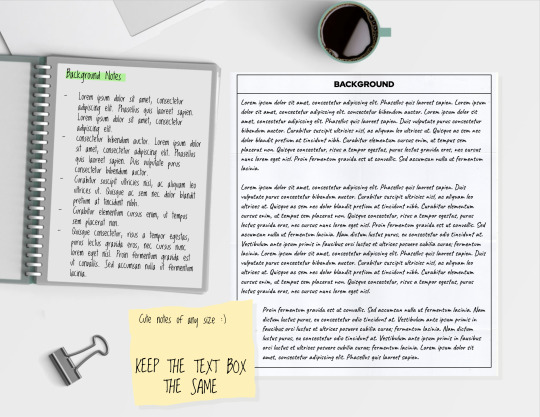
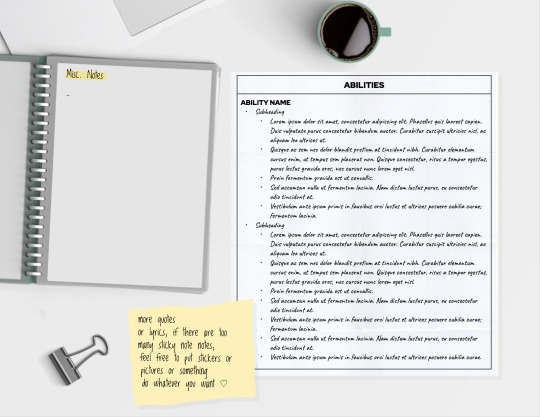
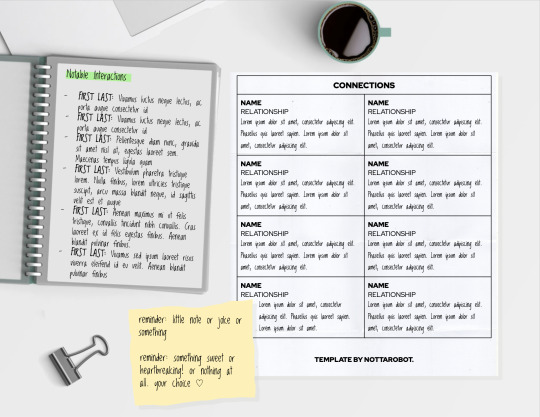
009. — NINE TO FIVE
A clean, simple paper template. It can be anything! From an application form to a special agent file with little bits and bobs for notes, lyrics, and even shopping lists. Built for plenty of text, it’s perfect for any characters with their fair share of lore.
&& —
Instructions on using and customising the document are provided with the purchase.
Please do not remove my credit.
The face claim used in the document is Dev Patel.
Likes and reblogs are appreciated :)
— DOWNLOAD
#nottarobot doc#google doc template#google docs template#rp template#character template#docs template#rp docs template#rp doc template#muse template#discord rp template#roleplay resources#rp resources#notes aesthetic#notes template#aesthetic notes template#file template#lore template
171 notes
·
View notes
Text
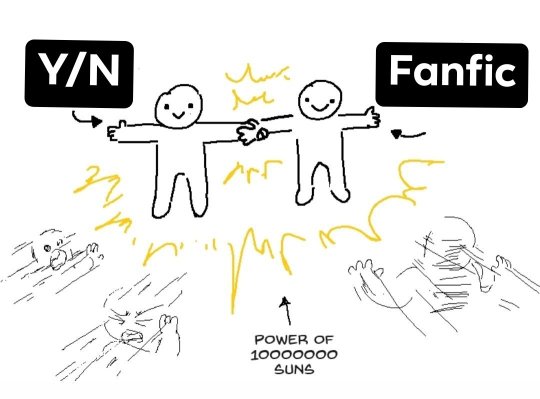
#the mandela catalogue x reader#tmc x reader#the walten files x y/n#the walten files x reader#x you#x reader#self insert fanfiction#self ship#danganronpa x reader#john doe x reader#muse arg x reader
648 notes
·
View notes
Text
i have so many thoughts after watching per manum, this is not happening & deadalive - but you know what I keep going back to? Scully being sooooo damn certain that Mulder is the only choice to be the father of her child.
Literally both times we see a direct question posed to Scully about becoming a mum, she turns to Mulder as the potential father.
In home, when Mulder, addressing solely Scully’s journey into motherhood, asks her to find someone with good genetics, she looks at him and asks “what about yours?” ITS SO !!!!!!!!!! Because the implication is sooooo clear - would you have good genetics to help me have a baby.
And then in per manum, when Dr Perrenti asks her if she has someone in mind and that he can walk her through donor catalogues etc., Scully’s immediate concern was not WHO to ask but HOW to ask him. Watching her say that made me weird levels of feral, because what do you mean you have no hesitation, no second thoughts about who deserves to be the father of your child!!!!!
Scully is always so careful about her choices (i.e. med school, joining the fbi etc.) and has a need to have her choices validated by others, which is common arc we see her struggle through in many episodes. Then, to have her be SO certain that if anyone were to father a child with her, of course it would be Mulder. There’s no other choice, there was never any other choice (despite what later plot lines might imply).
And honestly, even Mulder leans into this a bit. Thinking of Emily and how Mulder just slipped into taking care of Emily so easily, because this was Scully’s child. Sure, he had reservations, but once Scully decided she wanted to raise this little girl, Mulder was fully alongside her. (I still think of him lifting Emily when she was sick and my heart just feels pain).
Genuinely makes me want to cry because I think it really shows how much they love each other (whether they know it/have admitted it to themselves or not). And my personal take, is that Mulder and Scully, by s4 (probably end of s2 tbh), already considered the other family. In the sense that, hell or highwater, they were bonded in some transcendent way, and nothing will erase/change the very permanent mark they’ve already made in each other. That whatever happens, they will always have a path (back) to each other.
In, deadalive at the funeral Scully says, all of Mulder’s family is gone and Mulder is the last. And I just knowwwww that Scully always felt that Mulder deserved to have a family, deserved to have his name/legacy preserved, and wanted to give that to him. You see this in the ways she will always consider/defend who he is as a person (thinking of early S2 when the files were gone and also Demons and closure/sein und zeit).
Skinner says ‘I don’t truly believe Mulder’s the last’ - I can’t fully tell what exactly skinner was implying but I want to believe (hehe) that he’s referencing Scully’s pregnancy. Scully’s face shows a whole range of emotion after that but I also want to believe she’s considering what it now truly means to be carrying his baby.
Mulder usually has all the pretty words of declarations and long, yearning gazes (which I love love love) but omg to me, scully without hesitation, without question, choosing to have a baby that’s half mulder (esp when the usual method of getting there, i.e. being married/being in a relationship is not there) is one of the most beautiful acts of love from scully to mulder. And I don’t think mulder truly even knows it!!!!!!!
Mulder wants a family because it was robbed from him. He also wants Scully to have her child because she was robbed of her choice to motherhood. But Scully, Scully’s choice is to have a family, a child with Mulder, because she wants to bring back that kind of love to both of them.
#idk if i'm even articulating myself well#but been thinking and thinking and thinking about this sm#also thinking about how it's so unfair that we never got to see them fully be family in any capacity 😭#or at least that's what it seems like from what i've heard/spoilers i've seen#txf#msr#the x files#dana scully#fox mulder#i love both of them sm#and just want them to have payoff for all the shit they've had to go through yknow#ok gonna stfu now#txf musings
95 notes
·
View notes
Text
'who fell first, who fell harder' is just wayyy too easy with Mulder and Scully. You're telling me Fox 'Martyr' Mulder didn't recognize his feelings immediately and decide to painfully carry a torch for the better part of a decade? You're telling me Dana 'Repression' Scully didn't press everything back until she was so undeniably in love that the wind got knocked out of her?
263 notes
·
View notes
Text










Max & Daniel throwback to 2018 | Futsal in São Paulo | x
#max verstappen#daniel ricciardo#autumn posts#verstappencom admin I love you so much!! ❤️#I hadn't seen this whole video before (only their extremely delightful handshake!!)#love to imagine them rehersing that 😭💞✨#Max with his backwards cap and Daniel's laugh 💞🥹✨#just quick gifs before back to work!!#filing under things that are just new to me#❤️❤️❤️❤️❤️❤️❤️#thirsting silliness ahead but#also my insta froze after buffering the last post and I only got 'Daniel likes to take it by his hands. the balls' 😳🙂↕️#well yes! in my ho rn dog musings quite often! 🎺🐶#oh I'll stop there 🙂↕️✨#anyways maxiel my beloved always on my mind!!!!!!!#a wonderful day it seems with many more wonderful ones to come!!!! ❤️❤️
121 notes
·
View notes
Text
Hi I posted some of these elsewhere but you guys get my 3DS photos AND my regular phone photos yayyyyyy. Straight from BLIB (6:30 o clock show):







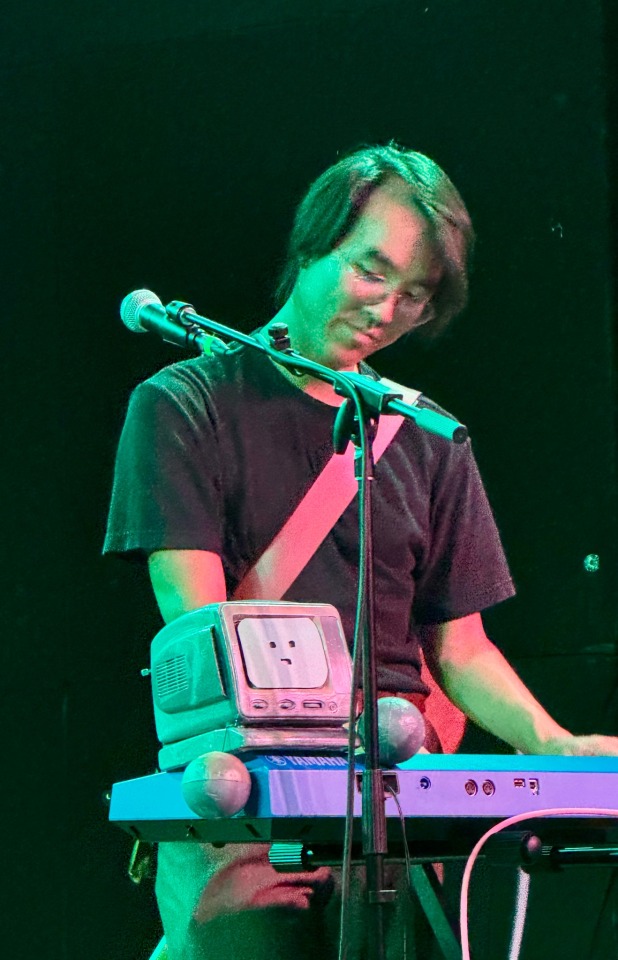
#louie zong#everydaylouie#worthikids#ian worthington#brian david gilbert#BDG#it was so fun!#though I can’t help but feel like it was still 3 independent musicians trying to each have the spotlight#not quite a cohesive band with roles and hierarchy and stuff#definitely all cool music!#but it felt like a third of each artist rather than a whole of a one band#does that make sense?#anyways love feeling the music in my body#also yeah I was the jackass in the front with the 3DS. one of two 3DSes. I see you Streetpasser.#wish the video files would play on my computer. they’re really funny.#BLIB#brian louie ian band#sorry worthikids. it was harder to take pics of ya.#Josie muses
76 notes
·
View notes
Text
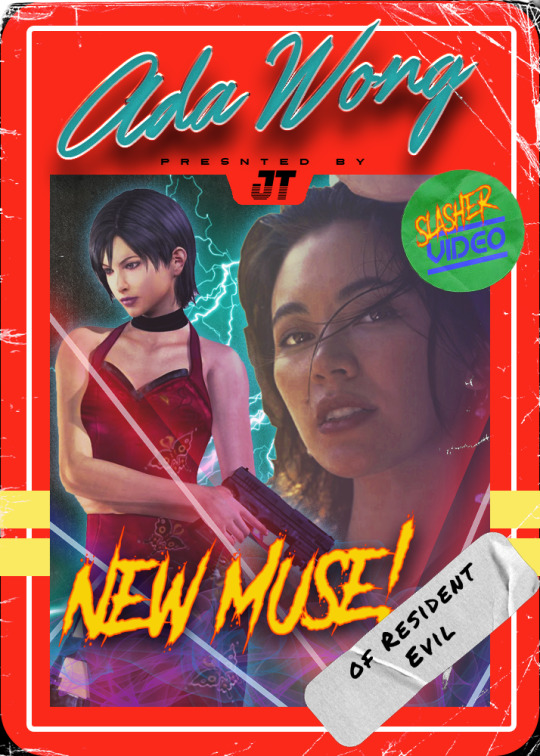
➠ New Muse Added: Ada Wong of Resident Evil
✘ stats
muse level: primary
fc: jessica henwick
type: canon
age: 20s-30s
gender: cis female
pronouns: she/her
sexuality: bisexual
✘ notes
Ada is canon to the games and animated films associated with them. I have not read the novelizations yet, so she may develop as I dive into those. Her background and much of her personality is all headcanon'ed by me to fill in gaps that aren't in canon.
3 notes
·
View notes
Text
muse - the handler during the soundcheck at exeter hall in 2015, aka the only time matt came close to perfecting the guitar solo while playing it live
uploading for archival purposes bc this isn't on any streaming site nor on musebootlegs
#muse#matt bellamy#chris wolstenholme#dom howard#dominic howard#muse band#muse live#personal#i want to gif this so bad but the quality is too low#the original file is only in 720p and each angle was shot by different cameras so the framerate kept changing dkfjhasdg#athena.uploads
120 notes
·
View notes
Text
Mulder saying "nobody would kill you Frohike, you're like a little puppy dog" at the beginning of Musings of a Cigarette Smoking Man is way more painful now knowing Frohike was supposed to die in this episode
42 notes
·
View notes
Text
The most unhinged lone gunmen moments are actually not in the x-files or the spinoff they're in the comics and novels where they 1) fake their death to live in a bunker 2) Langly gets really high with Mulder by accident 3) they become besties with the Transformers and worsties with the Ghostbusters
#x files#the lone gunmen#There's also that really unnecessarily angsty Christmas volume where Frohike and Langly get abducted#And Byers has to team up with Scully to find them and Mulder#macks musings
130 notes
·
View notes
Text
Inspired by this anon post from a while back:
Note: This is not a guarantee, this is a general speculation to gauge an audience.
#rotomblr hub#Katt's Musings#(I have like 6 Miitopia files)#(I can make a 7th)#rotomblr#pkmn irl#pokeblogging#pokeblog rp#ooc post#(As this is on the hub)
27 notes
·
View notes
Text









send me an idol and era ↳ sungah + hurt locker era for @ashmp3
#002#*eras#sungah#9muses#nine muses#goldeneraedit#femaleidolsedit#ggnet#femaleidol#femadolsedit#dazzlingidolsedit#useroro#awekslook#leksietag#niniblr#userdoyeons#analook#mg:9muses#m:sungah#EVERYONE SAY THANK U BELLA FOR .TS FILE#flashing tw
115 notes
·
View notes
Text
i always saw Scully as such a strong character but omg her in s8 truly takes the cake. Her determination to go on with x files cases despite mulder's disappearance — the amount of grit it would've taken for her to keep showing up every day; and this is pre Mulder's discovery so idk what to expect in the post of that. (maybe I am also projecting a bit, but honestly moving through the world after unexpected grief is an effort unlike anything else)
also i really did appreciate all the little tells of Scully's grief in missing Mulder/not knowing where he is throughout the first half of the season. From calling out to him in the desert, and falling asleep on his bed with his shirt and feeding his fish.
But esp in ep 10!! When she starts crying at the end, talking about how Mulder would've been non-judgemental and would've seen through things. The sheer will it must've taken her to trust in a another kid; trust in an unknown hypothesis and just shoot; I was literally holding my breath the whole time. And then just immediate tears at her monologue. Trying to show up in a way that honours the inclinations of someone you've lost (esp when you could always depend on them to do it for you) is truly one of the most profound and devastating acts of love. And god, you can so see Scully try to do this, by trying to emulate Mulder's openess to the impossible in the ways she could. You can also see this in ep 6 when the accused lawyer wanted to talk to Scully as someone who would at least be open to listening to him when he had something unbelievable to share. There's something so precious and vulnerable about this version of Scully, who is just trying her damn best despite the shittiest cards that have been thrown at her. (and this is not even addressing all the emotions that are heighten from an unexpected pregnancy??)
anyway, conclusion, somehow i've come to love Scully even more. She really is one of my all-time favourite characters!!
#honestly so glad i waited to watch this season#it's weirdly healing to watch a character I love navigate hardships#txf#the x files#s8#dana scully#txf musings
66 notes
·
View notes